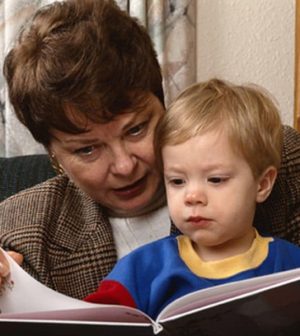- Could Your Grocery Store Meat Be Causing Recurring UTIs?
- Are You Making This Expensive Thermostat Error This Winter?
- Recognizing the Signs of Hypothyroidism
- 10 Strategies to Overcome Insomnia
- Could Artificial Sweeteners Be Aging the Brain Faster?
- Techniques for Soothing Your Nervous System
- Does the Water in Your House Smell Funny? Here’s Why
- Can a Daily Dose of Apple Cider Vinegar Actually Aid Weight Loss?
- 6 Health Beverages That Can Actually Spike Your Blood Sugar
- Treatment Options for Social Anxiety Disorder
Early Eye Checks for Kids a Smart Move

The earlier the better when it comes to having your child’s vision checked, eye experts say.
“Babies must have a vision screening by a health care professional soon after they are born, which must include an evaluation of the ‘red reflex’ of the eyes,” said Marcela Frazier. She’s an associate professor at the University of Alabama at Birmingham’s department of ophthalmology and visual sciences.
The red reflex test checks for abnormalities in the back of the eye.
“If an eye problem is suspected, then a comprehensive eye exam that includes the use of eye drops to dilate the pupil should be scheduled immediately. Children with developmental delays should also have a comprehensive eye exam, even if the vision screening is normal,” Frazier advised in a university news release.
Katherine Weise is a professor in the School of Optometry at UAB. “Vision screenings are good for detecting eye and visual conditions that may require further testing,” she said.
“A dilated eye exam allows for a more comprehensive look at the health of the eye. It also allows the eye doctor to determine the best glasses prescription for the child, if needed,” Weise explained.
She said “drops make it difficult for the child to see up close for a while and create a sensitivity to light. However, more accurate information is obtained from eye doctors who use dilating drops to examine the eyes of children.”
There are a number of signs that children may have vision problems.
“Squinting indicates a potential need for glasses, and covering an eye while reading indicates a potential difficulty in getting the eyes to work together efficiently,” Weise said.
Also, “complaints of eyestrain, intermittent blur or double vision, frequent headaches during the school week, or skipping lines and words when reading” may suggest a problem with eye coordination and tracking properly while reading, she said.
Parents also need to take steps to prevent eye injuries in children.
“Sport-related eye injuries are very common; therefore, we recommend sports goggles,” Frazier said.
“Injuries due to BB guns and fireworks are also very prominent and devastating. Some toys can have sharp edges that can cause injuries, so proper parental supervision is a must,” she said.
Frazier also warned that some household cleaning products can cause “severe damage when they come in contact with the eye; they must be stored away from the reach of children.”
More information
The American Academy of Pediatrics has more on vision screenings.
Source: HealthDay
Copyright © 2026 HealthDay. All rights reserved.










